Israel Says It Will Keep Golan As Assad's Fortunes, US Views Shift
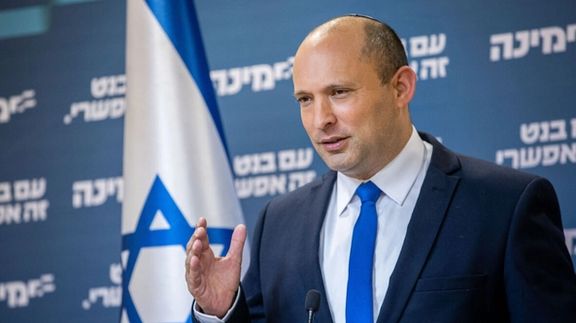
Israel will keep the Golan Heights, which it has annexed, even if international views on Damascus change, Israeli Prime Minister Naftali Bennett said on Monday.

Israel will keep the Golan Heights, which it has annexed, even if international views on Damascus change, Israeli Prime Minister Naftali Bennett said on Monday.
In 2019, then US President Donald Trump broke with other world powers by recognizing Israel as sovereign on the Golan Heights, which it annexed in 1981 in a move not recognized internationally.
Bennett's remarks came as the current US administration hedges on the Golan's legal status and some US-allied Arab states ease their shunning of Syrian President Bashar al-Assad over his handling of a decade-old civil war.
Bennett said the internal Syrian strife had "persuaded many in the world that perhaps it is preferable that this beautiful and strategic territory be in the State of Israel's hands.
"But even in a situation in which - as could happen - the world changes tack on Syria, or in relation to Assad, this has no bearing on the Golan Heights," he told the forum hosted by the conservative Makor Rishon newspaper.
In February, US Secretary of State Antony Blinken said, "As long as Assad is in power in Syria, as long as Iran is present in Syria, militia groups backed by Iran,” Golan’s control is important to Israel.
Report by Reuters
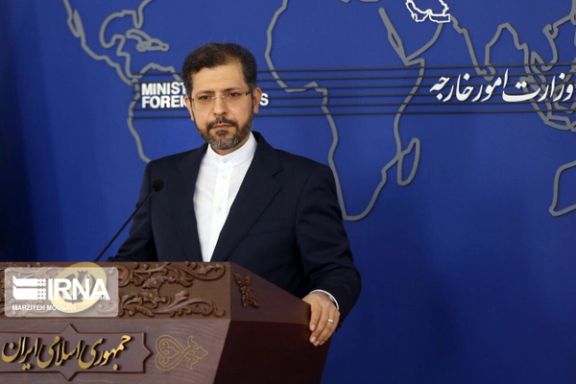
Iran's foreign ministry spokesman said Monday that talks with Saudi Arabia are now on a "more serious path", including discussion on resolving Yemen's conflict.
Saeed Khatibzadeh who was speaking at his weekly press conference said contacts have continued "uninterruptedly" between the two sides and messages have kept flowing. "The biggest focus has been on bilateral and regional issues, particularly the Persian Gulf region," he said adding that the issue of "Yemen has been part of the talks between the two sides". Efforts were being made to improve peace and stability in the Persian Gulf through better relations between Tehran and Riyadh, he said.
Iran and a Saudi Arabia-led coalition consisting mostly of Gulf Arab states support opposing sides in the Yemeni civil war since 2014. Many refer to the war in Yemen as a proxy conflict between Iran and Saudi Arabia. The war has been in a military stalemate for years, with the Iran-backed Houthis holding most northern regions of the war-ravaged country.
Khatibzadeh also told reporters that Iran is happy for the talks to continue in Baghdad and there is no need to change that.
Saudi Arabia and Iran held direct talks earlier this year brokered by Baghdad and vowed to continue the process. New president Ebrahim Raisi (Raeesi) has stressed his intention to improve relations with the Arab states in the Persian Gulf and some analysts regard this as reflected in the appointment of Amir-Abdollahian, who held responsibility for Arab affairs as deputy foreign minister (2011-16) and was ambassador to Bahrain from 2007 to 2010.
In response to a question on rumors that Lebanon had refused fuel to Amir-Abdollahian's plane during his recent visit to Beirut and that the delegation had to re-route to Damascus to take fuel before returning to Tehran, Khatibzadeh said the foreign minister's visit to Damascus had been planned ahead and Iran had not put any fuel requests to the Lebanese government.
In a tweet Sunday, Ramez Al-Kadi, a senior news reporter for Lebanon's Al Jadeed TV, claimed that Rafic Hariri International Airport had refused to supply fuel to the foreign minister's plane for fear of US sanctions and the Iranian delegation had to go to Damascus to fuel the plane. The original tweet has been removed but its screenshots are still available.
"There are some who don't want these trips to have success and make these insinuations," Khatibzadeh said
In response to another question, Iran's spokesman insisted that bases used by Iranian opposition Kurdish groups and parties in Kurdistan Autonomous Region (KAR) must be dismantled. "They can't be sources of insecurity against us, both Kurds and the Iraqi government know this."
Iranian Kurdish separatist and opposition groups have bases in northern Iraq and Tehran often says they infiltrate into its territory for operations against government targets. Iran last month used artillery and armed drones to attack targets in northern Iraq that it said were insurgent bases. Yahya Rahim-Safavi, the military adviser to Supreme Leader Ali Khamenei, warned Wednesday that Iran would not accept “any bordering country” hosting "anti-Iran terrorist groups."

The United Arab Emirates said on Sunday that the Gulf state and Syria had agreed on future plans to enhance economic cooperation and explore new sectors.
The Economy Ministry wrote on Twitter that the value of non-oil trade between the two countries in the first half of 2021 was one billion dirhams ($272 million).
The UAE re-opened its mission to Damascus in late 2018 in a bid to counter the influence of non-Arab actors like Iran, which along with Russia backs Syrian President Bashar al-Assad, and Turkey, which backs rebel forces.
Jordan also has been taking steps to reestablish contacts and interaction with Syria. King Abdullah spoke to al-Assad earlier this month for the first time in a decade. The two countries have fully opened their borders.
Analysts believe pro-West Arab states may have a desire to counter Iran’s influence in Syria, which came about during the civil war as Tehran played a major military and economic role to save the Assad regime from collapse.
The United States still has not changed its policy of shunning the Syrian government but some say US Arab allies are encouraging the Biden Administration to change the current policy.
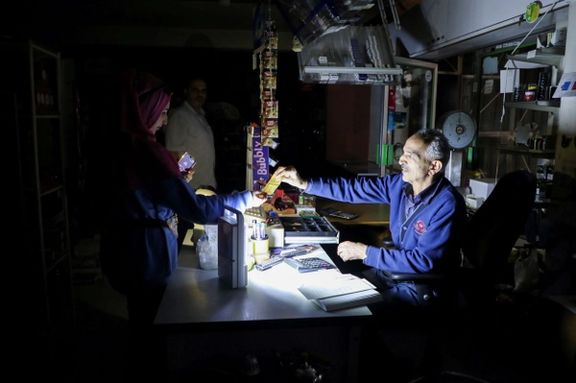
Lebanon's two main power plants were forced to shut down after running out of fuel plunging the country into darkness on Saturday, despite Iran sending fuel.
Iran began sending fuel to Hezbollah, its ally in Lebanon in September. The Shiite militia group said its arrangement with Iran would help the country amid a crippling energy crisis, but it is not clear why the shipments have not reached the power plants.
So far two vessels have docked at Syrian ports from where the fuel is being sent to Hezbollah by tanker trucks. Hundreds of these tankers are said to have delivered fuel.
Erratic power supplies have put hospitals and essential services in crisis mode.
The Lebanese increasingly depend on private operators that also struggle to secure supplies amid an unprecedented crash of the national currency.
The shortage of diesel and fuel, along with an antiquated infrastructure, has worsened power cuts that have been a fixture for years.
Blackouts that used to last for three to six hours could now leave entire areas with no more than two hours of state power a day.
On Saturday, the state electricity company said Zahrani power plant in the country's south was forced to shut down because of fuel shortage; the main plant in the north was shut down on Thursday.
Electricite Du Liban said the shutdown reduces the total power supply to below 270 megawatts, which means a major drop in the stability of the grid.
It said it would reach out to fuel facilities in the country's north and south to see if they can procure enough fuel to bring back power.
It added that a new shipment of fuel from Iraq is expected next week.
But the company, responsible for most of the government's debts, is dependent on credit from the country's central bank, which is struggling with dwindling reserves.
The government has gradually raised prices of fuel and diesel as the central bank cut back on subsidizing dollars for imports, adding to the hardships in Lebanon, where about three quarters of the population has plunged into poverty over the last year.
With prices soaring and unemployment at a record high, many families have given up private generators and few hours of state power a day is all they get.
On Saturday, distributors of gas canisters used for cooking and heating stopped operating, saying subsidy cuts amid black-market currency fluctuations meant they were selling at a loss.
The energy sector has been a huge drain on state coffers for decades.
The electricity company has annual losses of up to $1.5 billion and has cost the state more than $40 billion over the past decades.
Energy sector reforms have been a key demand by the World Bank and the International Monetary Fund.
Iran’s foreign minister Hossein Amir-Abdollahian who visited Lebanon October 7-8 promised more fuel deliveries while the government has no control over fuel already sent to Hezbollah.
Iraq has also made a swap deal with the government that has helped Lebanon's state electricity company stay operational for days.
The new Lebanese government is also negotiating supplies of electricity from Jordan and natural gas from Egypt, also through Syria.
But those deals are likely to take months.
With reporting by AP
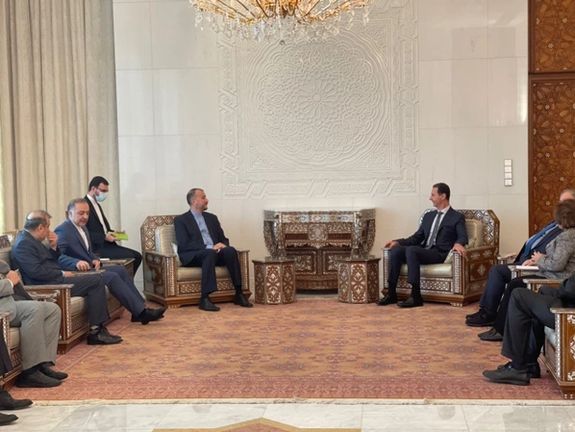
Hossein Amir-Abdollahian, foreign minister of the Islamic Republic of Iran visited Syria on Saturday and met with president Bashar al-Assad in Damascus.
The Islamic Republic News Agency, IRNA, reported that Amir-Abdollahian praised existing close relations and cooperation between Tehran and Damascus and said, “Conditions have shifted in Syria’s favor.”
Assad’s government has been isolated and sanctioned by Western and other countries since it began using military force against opponents after protests during the 2010 Arab Spring in the region.
Iran provided Assad with full military and substantial financial backing as the conflict turned into a civil war. Estimates say thousands of Iranian servicemen and Afghan and other proxy forces have been killed in Syria. Senior Iranian officials have said Iran has spent more that $30 to support Assad.
IRNA said that the Iranian foreign minister congratulated Assad for his government’s “military and international” successes and added that the diplomatic atmosphere as he witnessed during the United Nations General Assembly has shifted favor of Damascus.
Amir-Abdollahian also spoke about events in Afghanistan and said the US withdrawal shows the weakening of the Western axis.
Before arriving in Syria, Iran’s foreign minister visited Russia and Lebanon. Russia and Hezbollah in Lebanon are two other key allies of Assad.
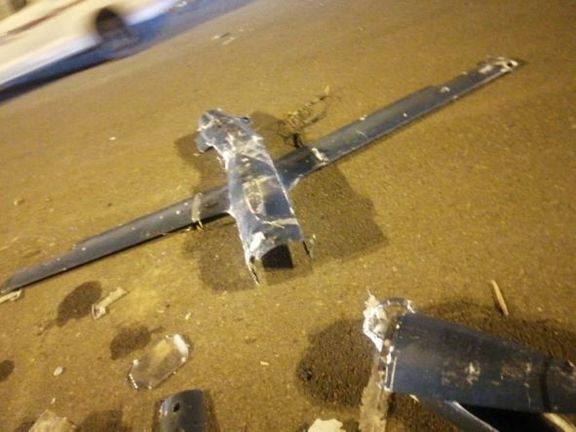
Ten people were injured in two explosives-laden drone attacks at King Abdullah airport in the southern Saudi city of Jizan late on Friday and early on Saturday.
There was no immediate claim of responsibility by Iran-backed Houthis, who regularly launches drone and missile attacks targeting the gulf kingdom.
The latest attack comes as Saudi Arabia and Iran are engaged in talks to address tensions in their relations that have especially prevalent since they broke diplomatic ties five years ago.
Iran’s foreign minister Hossein Amir-Abdollahian in a visit to Lebanon on Thursday and Friday emphasized that the talks are on the right track and highlighted their importance for regional security.
Six Saudis, three Bangladeshi nationals and one Sudanese were injured in the first attack, Saudi state media said, citing a coalition spokesman. Some of the airport's facade windows were shattered in the attack, the spokesman said.
A second explosives-laden drone was intercepted early on Saturday, the coalition said, without giving details on any injuries or damages.
The military coalition intervened in Yemen in 2015, backing forces of the ousted government of President Abdrabbuh Mansur Hadi and fighting the Iran-aligned Houthi group.